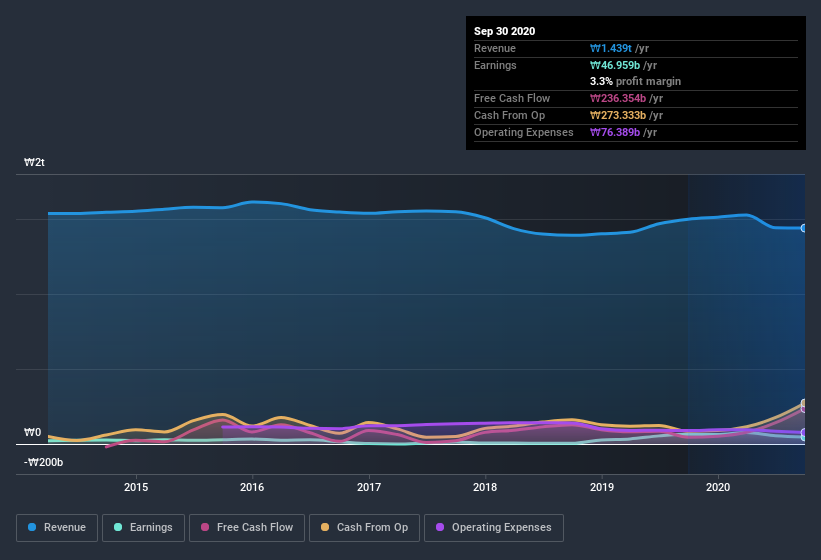- South Korea
- /
- Auto Components
- /
- KOSE:A036530
Are S&T Holdings' (KRX:036530) Statutory Earnings A Good Guide To Its Underlying Profitability?
It might be old fashioned, but we really like to invest in companies that make a profit, each and every year. Having said that, sometimes statutory profit levels are not a good guide to ongoing profitability, because some short term one-off factor has impacted profit levels. Today we'll focus on whether this year's statutory profits are a good guide to understanding S&T Holdings (KRX:036530).
While S&T Holdings was able to generate revenue of ₩1.44t in the last twelve months, we think its profit result of ₩47.0b was more important. As depicted below, while its revenue may have fallen over the last few years, its profit actually improved.
View our latest analysis for S&T Holdings

Of course, it is only sensible to look beyond the statutory profits and question how well those numbers represent the sustainable earnings power of the business. Today, we'll discuss S&T Holdings' free cashflow relative to its earnings, and consider what that tells us about the company. Note: we always recommend investors check balance sheet strength. Click here to be taken to our balance sheet analysis of S&T Holdings.
Examining Cashflow Against S&T Holdings' Earnings
Many investors haven't heard of the accrual ratio from cashflow, but it is actually a useful measure of how well a company's profit is backed up by free cash flow (FCF) during a given period. In plain english, this ratio subtracts FCF from net profit, and divides that number by the company's average operating assets over that period. The ratio shows us how much a company's profit exceeds its FCF.
As a result, a negative accrual ratio is a positive for the company, and a positive accrual ratio is a negative. That is not intended to imply we should worry about a positive accrual ratio, but it's worth noting where the accrual ratio is rather high. Notably, there is some academic evidence that suggests that a high accrual ratio is a bad sign for near-term profits, generally speaking.
S&T Holdings has an accrual ratio of -0.19 for the year to September 2020. Therefore, its statutory earnings were very significantly less than its free cashflow. In fact, it had free cash flow of ₩236b in the last year, which was a lot more than its statutory profit of ₩47.0b. S&T Holdings shareholders are no doubt pleased that free cash flow improved over the last twelve months.
Our Take On S&T Holdings' Profit Performance
As we discussed above, S&T Holdings' accrual ratio indicates strong conversion of profit to free cash flow, which is a positive for the company. Based on this observation, we consider it possible that S&T Holdings' statutory profit actually understates its earnings potential! Better yet, its EPS are growing strongly, which is nice to see. The goal of this article has been to assess how well we can rely on the statutory earnings to reflect the company's potential, but there is plenty more to consider. Just as investors must consider earnings, it is also important to take into account the strength of a company's balance sheet. If you're interested we have a graphic representation of S&T Holdings' balance sheet.
This note has only looked at a single factor that sheds light on the nature of S&T Holdings' profit. But there are plenty of other ways to inform your opinion of a company. For example, many people consider a high return on equity as an indication of favorable business economics, while others like to 'follow the money' and search out stocks that insiders are buying. So you may wish to see this free collection of companies boasting high return on equity, or this list of stocks that insiders are buying.
When trading S&T Holdings or any other investment, use the platform considered by many to be the Professional's Gateway to the Worlds Market, Interactive Brokers. You get the lowest-cost* trading on stocks, options, futures, forex, bonds and funds worldwide from a single integrated account. Promoted
New: Manage All Your Stock Portfolios in One Place
We've created the ultimate portfolio companion for stock investors, and it's free.
• Connect an unlimited number of Portfolios and see your total in one currency
• Be alerted to new Warning Signs or Risks via email or mobile
• Track the Fair Value of your stocks
This article by Simply Wall St is general in nature. It does not constitute a recommendation to buy or sell any stock, and does not take account of your objectives, or your financial situation. We aim to bring you long-term focused analysis driven by fundamental data. Note that our analysis may not factor in the latest price-sensitive company announcements or qualitative material. Simply Wall St has no position in any stocks mentioned.
*Interactive Brokers Rated Lowest Cost Broker by StockBrokers.com Annual Online Review 2020
Have feedback on this article? Concerned about the content? Get in touch with us directly. Alternatively, email editorial-team (at) simplywallst.com.
About KOSE:A036530
SNT Holdings
SNT Holdings Co., Ltd engages in manufacturing and selling automobile parts and industrial facilities businesses.
Excellent balance sheet and good value.
Market Insights
Community Narratives



